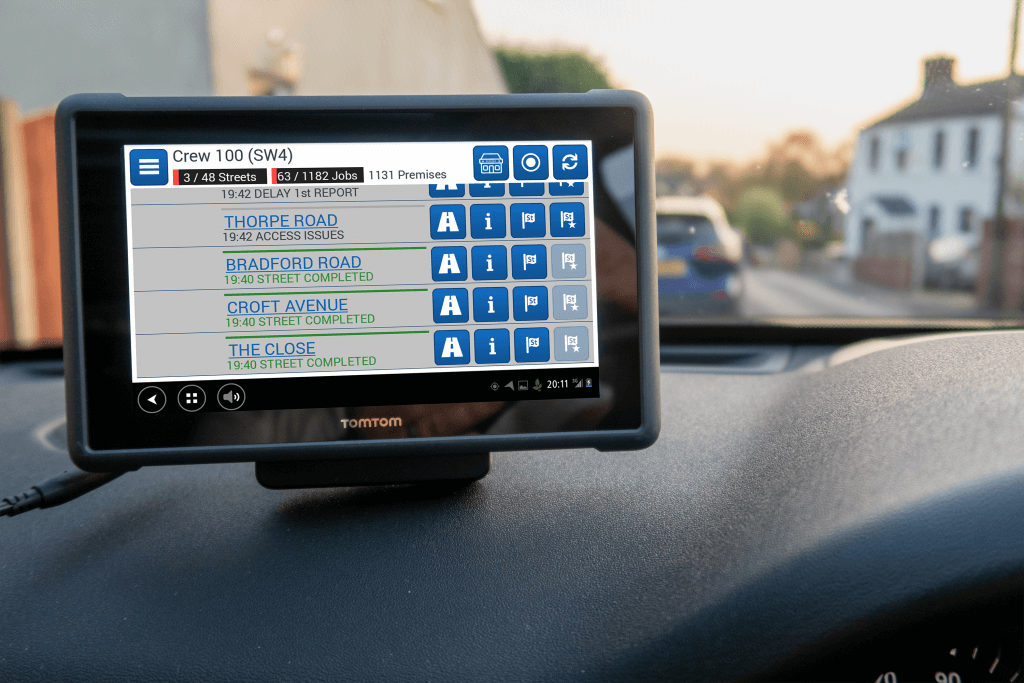I studied data for assisted collections on one day in July. The figures are quite shocking.
It is universal now that waste and recycling is collected from the kerbside. The householder must take the bin out each week and then bring it in again once it’s been emptied.

Lots of people need help to do this because nobody living there is able to manage the size or weight of a full bin. These households will qualify for an ‘assisted collection’ – the collection crew will come into their garden and wheel the bin out for them (and usually back again).
When a collection round has over 1,000 bins to empty it’s a challenge for the council get this right every time. It also takes time to do and that must be planned into the routes.
In this article I explore the impact of assisted collections on the waste service as whole.
The number of households with assisted collections varies from council to council, but I wanted to get a feel for how this impacts on collections. Luckily, we have a lot of data to work from so I sampled over 70 of our live customer systems on a single weekday in July 2022.
On average, 3.3% of collections were assisted but there was a very big variation. 2 councils had less than 1% and one council had 11.1% of their collections assisted! I expected to see the highest figures in our rural and coastal clients, based on their older demographic. Although this was true of the one highest council, it actually did not follow as a general trend.
The costs of providing an assisted collection service are two-fold.
Firstly, there are the costs of the extra crew time taken to provide the service. It clearly takes longer to go into the garden of a property than to collect and return the bin when it’s at the kerbside. This adds time to the route and reduces overall productivity.
Secondly, councils must provide a process to manage the service, allow people to apply for it, review the performance of it, train crews to carry it out and communicate how the service works to their residents. Those costs may not scale proportionately to the number of assisted collections, especially if they are computerised rather than relying on manual administration.
I made an assumption that an assisted collection takes an additional 30 seconds compared to a standard kerbside bin. From our data I then calculated the additional working time required on a typical day.
On that day, one of the councils in our sample group spent over 42 additional working hours on assisted collections. For an ‘average’ crew with 2 loaders on a 7-hour day that equates to 3 whole routes on that day!
The average, across all 76 authorities, was 9.4 working hours, still almost an entire working route, every day. The additional cost, for that one day, of providing assisted collections across our sample of 70 councils was £10,683.
The cost of administering the service is more difficult to quantify. It’s unlikely that any authority is in a completely ‘start-up’ position with no service or processes already in place. There is likely to be a considerable ‘sunk cost’ in your service already. For example,
Occasionally, someone in the organisation will request a review of the policy. If anything changes, then it’s likely that all the costs above recur to some extent.
We’ve considered the cost of creating and operating the assisted collection service. Unfortunately, sometimes councils will get the service wrong. No matter how good the processes and people are, with thousands of jobs daily there are going to be failures. When a council misses an assisted collection they need to put it right quickly.

I know first hand that assisted collections are a major cause of ‘missed bins’, and anecdotally the cost of rectifying collection mistakes is reckoned at anywhere between £25 and £75 per bin. If, each day, our ‘average’ council makes a mistake with 1 in 1,000 assisted collections then it will spend £7,300 per annum (using the lower £25 per bin cost) on correcting assisted collection failures, but the highest end of our range indicates one council could be spending almost £40,000 per annum on assisted collection failures.
I estimate the total cost, on that one Thursday in July, of correcting mistakes in the assisted collections service across 70 councils may have been £557,036!
The cost of returning to missed bins is heavily linked to costs of fuel, vehicles and staff time. All those costs are rising year on year, more so now than at any time in the last 30 years. The only effective way to reduce the cost of missed bins is to reduce the number of bins we miss!
Nobody wants to remove or diminish this crucial service from residents. Councils are rightly keen to provide assistance to their residents where needed.
Clearly though, there is much to gain from making it easier to apply, less prone to human error, free from administrative burden and focussed on those who need it. The good news is that all the necessary tools are readily available once we step back and look at the whole service.
The simpler councils make their policy, the less administration it is likely to take. Whilst some councils require extensive evidence of need to support an application, many others simply accept the request at face-value. This removes barriers for those who really need the service, with the associated risk that some people who do not need it may be included.
This approach makes the policy simpler and with lower training and enforcement requirements. Webforms are simpler and therefore cheaper, both to create and maintain and less likely to be dependent on integration with other systems. It’s also pretty obvious that a process that always says ‘yes’ is unlikely to generate many complaints and appeals, which further reduces the administrative burden.
A good waste management system will collect all the data about assisted collections alongside bin records and collection schedules.
Having all this information in one place allows the system to allow appropriate time for each collection when designing and optimising routes. It can also optimise for the right number of loaders on each route.
Crews do not want to miss collections and do work hard to get every bin. Frequent changes to routes make this more difficult and it’s important that crews have clear and precise instructions available to them as they work. A note in a briefing pack or update a paper round sheet will not suffice – it is simply not possible for crews to read paperwork for each street or premises they attend.
In-cab and mobile systems can be used to alert crews to changes in their route as they work. Crews need to be able to see summary information for the jobs they are closest to, with audible and visible prompts for things that have changed recently, including new assisted collections.

We should not ignore the daily briefing and driver’s information pack either. Even the most robust technology needs fallbacks for times when a spot-hire vehicle is deployed without a device fitted, an untrained agency driver is in place or times when the system is out of use. The ‘crew papers’ are a vital safety net and should be updated regularly to ensure they have the same information as the live system.
Finally, supervisors may need a way to enforce additional attention to specific premises. If a household is newly-added to the assisted service or has recently had service problems such as missed collections then it is desirable to flag that and require that the crew specifically acknowledge it. In-cab computers can enforce this and ensure new or problem collections are not overlooked.
Dealing With Mistakes
The measures above should reduce the number of assisted collections which are missed and particularly improve the reliability of new assisted collections. Mistakes will still happen of course, so how can councils respond and learn from them?
The first priority for a missed assisted collection should be to rectify the error. Wherever possible I would advocate for this being done by the original crew. Returning for the missed collection is a strong means to embed the knowledge of that particular collection and reinforces ownership with the crew.
Secondly, try to understand why the collection was missed. People do make mistakes but there may be an underlying cause. Is the premises easily visible from the road? Was the gate locked or were the bins inaccessible? Was it the usual crew or were there agency staff or inexperienced loaders on the crew?
Onboard cameras can replay the collection directly into the waste management system. Team leaders can use this to work with crews to really understand the root cause of the problem and prevent a recurrence.
All this helps you to understand if changes to the design of the round could reduce the risk of mistakes in the future or whether crew training or monitoring could help. It may simply be that an additional reminder or alert would be appropriate.
Regardless of this, the crew should receive specific instructions to pay special attention to that premises in future weeks to ensure that the mistake is not immediately repeated!
There are many factors here beyond the control of councils. The ageing population and increasing labour and fuel costs guarantee that the number of assisted collections and the costs of providing them will keep going up.
As is often the case, effective communication is essential. Give residents simple ways to access their service and much of the administrative cost can be removed as people naturally shift to the easiest channel for them. Good technology for crews makes them less likely to make mistakes and makes it easier for managers to listen to their advice and experiences.
With the right systems in place, councils can provide a better assisted collection service at a much lower cost.
We want to help you do better
We’re here to help you towards a better future with a happier public.
industry updates and news
Keep up to date with the waste collection industry and discover expert insights from our team.
Portsmouth City Council bring waste and recycling service in-house
Tim Hobbs
Apr 12, 2024 • 26 sec read
Are garden waste stickers necessary if you have in-cab waste technology?
Tim Hobbs
Jan 9, 2024 • 2 min read
Missed bins are a negative experience for everyone, but it doesn't have to be that way.
Tim Hobbs
Dec 17, 2023 • 4 min read